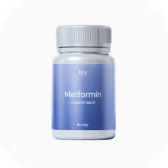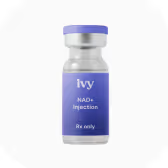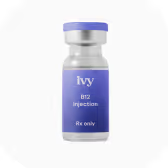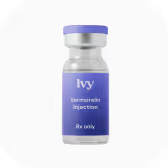


Ozempic
$1,399
A weekly semaglutide shot to improve insulin sensitivity, reduce appetite, and regulate blood sugar.
Same price at every dose
No hidden fees or membership cost
No insurance required
24/7 unlimited support

How to take
Compounded GLP-1s are only one injection per week. If prescribed, a licensed provider will include treatment instructions with your weight loss plan.
Potential side effects
Some people may experience common side effects like nausea or an upset stomach while their body adjusts to the medication. Your dosage and how quickly you increase it are personalized to your needs. Your provider can make adjustments anytime to help you feel your best. You’ll also have 24/7 access to licensed providers through secure messaging—always at no extra cost.
Potential benefits
No insurance needed. IVY RX offers clear, upfront pricing and affordable generic options—making it easy and accessible to take care of yourself, no complications or surprises.
How Ozempic® works
Mimics GLP-1
Slows digestion
Reduces appetite

Why Ozempic?
Join 200,000+ patients feeling their best
All your questions, answered
Can I cancel anytime?
Absolutely! We understand that circumstances may change, and there are no long-term contracts or cancellation fees involved. We are committed to customer satisfaction.
Do I need insurance?
No, IVY RX does not require insurance. We keep things simple with transparent pricing, straightforward billing, and affordable generic options—making it easier than ever to take care of yourself.
Can I talk to a doctor?
Absolutely! You can quickly and securely message your care providers through our patient portal. Simply log in, choose your provider, and send them a message. It’s that easy!
How much weight will I lose?
Because our program is backed by science and designed by experts, your unique treatment plan aims to foster healthy, sustainable weight loss. However, every individual’s journey is different, so the speed and extent of your results will vary. To help ensure you reach your goals, consider incorporating these healthy habits into your daily routine: Take your medication as directed, support your progress with nutritious meals, engage in consistent, moderate physical activity.
What are the most common semaglutide side effects?
Semaglutide can cause several side effects, many of which typically become less bothersome within the first few weeks of treatment. The most commonly reported include:NauseaVomitingStomach upsetAbdominal painConstipationDiarrheaHeartburn and acid refluxExcessive belching and gasDizzinessHeadachesFatigueMost side effects are temporary and resolve on their own. However, if side effects persist or worsen, consult a healthcare professional for advice.
Important Safety Information for Ozempic (semaglutide) injection
Warning: Risk of Thyroid C-Cell Tumors
- In studies with mice and rats, semaglutide (the active ingredient in Ozempic and Wegovy) caused thyroid tumors, including thyroid cancer. It is not known if Ozempic will cause thyroid tumors or a type of thyroid cancer called medullary thyroid carcinoma (MTC) in people. Tell your provider if you get a lump or swelling in your neck, hoarseness, trouble swallowing, or shortness of breath. These may be symptoms of thyroid cancer.
- Do not use Ozempic if you or any of your family have ever had a type of thyroid cancer called medullary thyroid carcinoma (MTC) or if you have an endocrine system condition called Multiple Endocrine Neoplasia syndrome type 2 (MEN 2).
What is the FDA-approved use of Ozempic?
Ozempic is a glucagon-like peptide-1 (GLP-1) receptor agonist that is used:
- with diet and exercise to improve glycemic control in patients with type 2 diabetes mellitus.
- to reduce the risk of major adverse cardiovascular events in patients with type 2 diabetes mellitus and established cardiovascular disease.
Limitations of Use:
- Ozempic has not been studied in patients with a history of pancreatitis.
- Ozempic is not for treatment of type 1 diabetes mellitus.
Your provider may recommend the use of Ozempic as treatment for chronic weight management (obesity or overweight).
Who should not use Ozempic?
Do not use Ozempic if:
- You or any of your family have ever had a type of thyroid cancer called medullary thyroid carcinoma (MTC) or if you have an endocrine system condition called Multiple Endocrine Neoplasia syndrome type 2 (MEN 2).
- You have a known allergic reaction to semaglutide (the active ingredient in Wegovy or Ozempic).
How should Ozempic be administered?
You can take Ozempic with or without food. The pre-filled injector pen is self-administered as a subcutaneous injection in the stomach, thigh, or upper arm once a week on the same day every week. Your provider will guide you on a treatment regimen that may include an increase in dose every four weeks.
You should not change your dosing regimen or stop taking Ozempic as prescribed without discussing with your provider first.
What should I tell my provider before using Ozempic?
- Ozempic has certain drug interactions.
- It’s important to tell your provider all of the medications you are currently taking, including prescription, over-the-counter medications, vitamins, and herbal and dietary supplements.
Some medications to watch out for include:
- Medications used to treat type 1 or type 2 diabetes, including insulin or sulfonylureas (such as Amaryl or Glucotrol XL)
- Ozempic causes a delay in gastric emptying so it has the potential to impact the absorption of medications that are taken by mouth at the same time. Your provider can guide you on how to schedule your medications.
- Other GLP-1 medications, including Wegovy, Saxenda, Victoza, Byetta, or Bydureon
- If you’re using other products for weight loss, including dietary supplements
It’s important to share your entire medical history with your provider. In particular, tell your provider if you have a past history of:
- Type 1 or type 2 diabetes
- Thyroid cancer
- Pancreatitis
- Kidney disease
- Diabetic retinopathy
- Depression
- Suicidal thoughts or behavior
Tell your provider if you are pregnant, planning to become pregnant, or breastfeeding.
- If you are pregnant: Ozempic should not be used during pregnancy. Based on animal studies, there may be potential risks to an unborn baby from exposure to Ozempic during pregnancy. There is no benefit to weight loss during pregnancy and it may cause harm to the unborn baby.
- If you are a female or male of reproductive potential: Discontinue Ozempic at least 2 months before a planned pregnancy since the drug can stay in the bloodstream for a long time.
- If you are breastfeeding: Ozempic was found in the milk of lactating rats. Tell your provider if you are breastfeeding before you start Ozempic.
Pregnancy registry: There is a pregnancy exposure registry that monitors pregnancy outcomes in women exposed to semaglutide (the active ingredient in Ozempic and Ozempic) during pregnancy. Pregnant women exposed to semaglutide and healthcare providers are encouraged to contact Novo Nordisk at 1-800-727-6500.
Withholding or providing inaccurate information about your health and medical history in order to obtain treatment may result in harm, including, in some cases, death.
What are the most serious side effects that I or a caregiver should monitor for when taking Ozempic?
If you are experiencing a medical emergency, call 911 or seek immediate medical attention.
These serious side effects can occur with Ozempic. You or a caregiver should carefully monitor for these side effects, especially in the beginning of treatment and with dose changes.
- Thyroid C-Cell Tumors: In mice and rats, semaglutide (the active ingredient in Ozempic and Ozempic) caused an increase in thyroid C-cell tumors, including medullary thyroid carcinoma (MTC). It is unknown whether Ozempic causes thyroid C-cell tumors in humans. There were cases of MTC reported in patients who took liraglutide (the active ingredient in Victoza and Saxenda) after the drug was put on the market. Ozempic is contraindicated in patients with a family history of MTC or in patients with Multiple Endocrine Neoplasia syndrome type 2 (MEN 2). Tell your provider if you get a lump or swelling in your neck, hoarseness, trouble swallowing, or shortness of breath. These may be symptoms of thyroid cancer.
- Inflammation of Pancreas (Acute Pancreatitis): Monitor for signs of acute pancreatitis, including severe abdominal pain that does not go away, sometimes radiating to the back, with or without vomiting.
- Diabetic Retinopathy Complications in Patients with Type 2 Diabetes: If you have type 2 diabetes, tell your provider right away if you experience changes in vision.
- Never Share a Pen: Pen-sharing poses a risk of infection.
- Low Blood Sugar (hypoglycemia): Ozempic lowers blood glucose. It can cause too low blood sugar in patients with type 2 diabetes who also take another glucose control medication. Monitor your blood sugar and watch out for signs of too low blood sugar such as dizziness, blurred vision, mood changes, sweating, or fast heartbeat.
- Acute Kidney Injury: In people who have kidney problems, diarrhea, nausea, and vomiting may cause a loss of fluids (dehydration) which may cause kidney problems to get worse. It is important for you to drink plenty of water to help reduce your chance of dehydration.
- Serious Allergic Reactions: Stop using Ozempic right away if you experience symptoms of a serious allergic reaction, including swelling of your face, lips, tongue or throat, severe rash or itching, very rapid heartbeat, problems breathing or swallowing, or fainting or feeling dizzy.
- Acute Gallbladder Disease: Ozempic may cause gallbladder problems, including gallstones. Some gallbladder problems require surgery. Tell your provider right away if you have pain in your upper stomach, yellowing of skin or eyes (jaundice), fever, or clay-colored stools.
- Increase in Heart Rate: Tell your provider right away if you have a racing heartbeat while at rest.
- Suicidal Behavior and Ideation:
- You should pay attention to any mental health changes, especially sudden changes in your mood, behaviors, thoughts, or feelings. Call your healthcare provider right away if you have any mental changes that are new, worse, or worry you.
What are the most common side effects of Ozempic?
- Nausea
- Vomiting
- Diarrhea
- Stomach pain
- Constipation
You are encouraged to report negative side effects of prescription products:
- Contact Novo Nordisk Inc. at 1-833-934-6891
- Contact FDA MedWatch at 1-800-FDA-1088 or visit www.fda.gov/medwatch
This information is not comprehensive. Please see the full Prescribing Information for complete safety information.

















.avif)



























